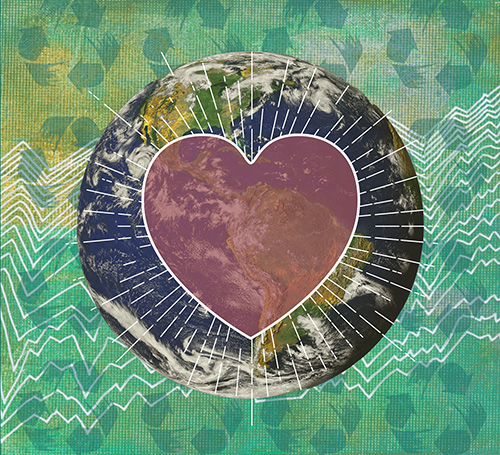VOLVER A LA TIERRA TOUR / Back To Earth Journey (Previously funded 2020)
Back to Earth is an artistic and innovative project showing the importance of the Sierra Nevada de Santa Marta [Santa Marta’s snow-capped mountain range], located
Our shop will be on a break between January 4th – January 23rd. All orders placed between these dates will be processed on our return. Thank you!
We are gloriously, inescapably earthbound and yet we disregard our home at our own peril.
Our world is calling out, louder than ever, to wake up, listen deeply, and come into the right relationship with our land to save what we have left and plant the seeds for a thriving future.
The truth is that climate action and sustainable stewardship of our natural resources are essential for our survival here on Earth.
We can no longer turn our heads and ignore what we don’t want to see. It’s time to change.
How will we honour and care for our Mother?
#STWEnvironment

We are gloriously, inescapably earthbound and yet we disregard our home at our own peril.
Our world is calling out, louder than ever, to wake up, listen deeply, and come into the right relationship with our land to save what we have left and plant the seeds for a thriving future.
The truth is that climate action and sustainable stewardship of our natural resources are essential for our survival here on Earth.
We can no longer turn our heads and ignore what we don’t want to see. It’s time to change.
How will we honour and care for our Mother?
#STWEnvironment
Back to Earth is an artistic and innovative project showing the importance of the Sierra Nevada de Santa Marta [Santa Marta’s snow-capped mountain range], located
Yonkers, NY – Munsee Lenape and Wappinger land
STONO is a concert-ritual exploring the 1739 Stono slave rebellion through the voices of its beyond-human participants: ancestors, water, mushrooms, guns, drums, the Kongolese Virgin
State of Pernambuco, Brazil – Tabajara lands
Oxnard, California – Chumash and Micqanaqa’n land
Philippines – Turtle Island
As a botanist, Robin Wall Kimmerer has been trained to ask questions of nature with the tools of science. As a member of the Citizen Potawatomi Nation, she embraces the notion that plants and animals are our oldest teachers. In Braiding Sweetgrass, Kimmerer brings these lenses of knowledge together to show that the awakening of a wider ecological consciousness requires the acknowledgment and celebration of our reciprocal relationship with the rest of the living world. For only when we can hear the languages of other beings are we capable of understanding the generosity of the earth, and learning to give our own gifts in
Give up your climate guilt. Sharpen your curiosity. Join Dr. Leah Stokes and Dr. Katharine Wilkinson as they tell stories about the powerful forces behind climate change — and the tools we have to fix it. This show is for the climate curious people who know climate change is a problem, but are trying to figure out how to tackle
Winona LaDuke is a leader in cultural-based sustainable development strategies, renewable energy, sustainable food systems and Indigenous rights. To Be a Water Protector, explores issues that have been central to her activism for many years — sacred Mother Earth, our despoiling of Earth and the activism at Standing Rock and opposing Line
This brand-new podcast will take listeners on a one-of –a-kind journey as they learn from Dr. Goodall’s extraordinary life, hear from changemaking guests from every arena, and become awed by a growing movement sparked by Jane and fueled by
Freedom Farmers expands the historical narrative of the black freedom struggle to embrace the work, roles, and contributions of southern Black farmers and the organizations they formed. Whereas existing scholarship generally views agriculture as a site of oppression and exploitation of black people, this book reveals agriculture as a site of resistance and provides a historical foundation that adds meaning and context to current conversations around the resurgence of food justice/sovereignty movements in urban spaces like Detroit, Chicago, Milwaukee, New York City, and New
Serialized in three parts in The New Yorker, where President John F. Kennedy read it in the summer of 1962, Silent Spring was published in August and became an instant best-seller and the most talked about book in decades. Utilizing her many sources in federal science and in private research, Carson spent over six years documenting her analysis that humans were misusing powerful, persistent, chemical pesticides before knowing the full extent of their potential harm to the whole